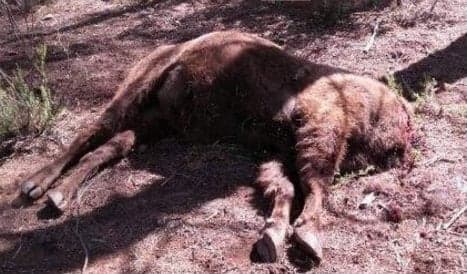Wildlife ranger accused over decapitated bison in Valencia

When two headless bison were discovered at a nature reserve in eastern Spain wildlife police launched a search for trophy hunters who they believed had poisoned the animals to death before removing their heads.
The bizarre crime against the protected animals caused outrage in Spain but now the case has taken a surreal twist with the arrest of the head of the wildlife park.
Carlos Álamo, the director of Valdeserrillas Nature park, had taken to social media to decry the death of two males in his beloved herd, animals that were brought to Spain last year as part of a bison reintroduction programme funded by the European Union.
But he appeared in court this week after being charged for negligence following a post mortem on the animals that appeared to suggest they had been starved to death.
The headless corpse of Sauron, the 660-kilo (1,455-pound) alpha male of the herd had been found in the park in mid-September followed a week later by the discovery of a second headless animal.
Initially investigators had followed the theory that the animals had been poisoned before their heads were cut off with an axe by trophy hunters, after poison pellets were discovered.
But the park director now stands accused of having behead the animals himself to cover up the fact that they had died of malnutrition.
The European bison, the continent's largest wild land mammal, once roamed across most of the continent but it was severely hunted until it finally became extinct in the wild in 1927, according to the World Wildlife Fund.
The owners of the reserve planned to introduce female bison to the site later this year to allow the herd to reproduce, a project that has now been shelved.
The animal has been reintroduced into the wild across Europe over the past few decades and the species' global population now stands at around 5,500, according to the environmental organisation.
Comments
See Also
The bizarre crime against the protected animals caused outrage in Spain but now the case has taken a surreal twist with the arrest of the head of the wildlife park.
Carlos Álamo, the director of Valdeserrillas Nature park, had taken to social media to decry the death of two males in his beloved herd, animals that were brought to Spain last year as part of a bison reintroduction programme funded by the European Union.
But he appeared in court this week after being charged for negligence following a post mortem on the animals that appeared to suggest they had been starved to death.
The headless corpse of Sauron, the 660-kilo (1,455-pound) alpha male of the herd had been found in the park in mid-September followed a week later by the discovery of a second headless animal.
Initially investigators had followed the theory that the animals had been poisoned before their heads were cut off with an axe by trophy hunters, after poison pellets were discovered.
But the park director now stands accused of having behead the animals himself to cover up the fact that they had died of malnutrition.
The European bison, the continent's largest wild land mammal, once roamed across most of the continent but it was severely hunted until it finally became extinct in the wild in 1927, according to the World Wildlife Fund.
The owners of the reserve planned to introduce female bison to the site later this year to allow the herd to reproduce, a project that has now been shelved.
The animal has been reintroduced into the wild across Europe over the past few decades and the species' global population now stands at around 5,500, according to the environmental organisation.
Join the conversation in our comments section below. Share your own views and experience and if you have a question or suggestion for our journalists then email us at [email protected].
Please keep comments civil, constructive and on topic – and make sure to read our terms of use before getting involved.
Please log in here to leave a comment.